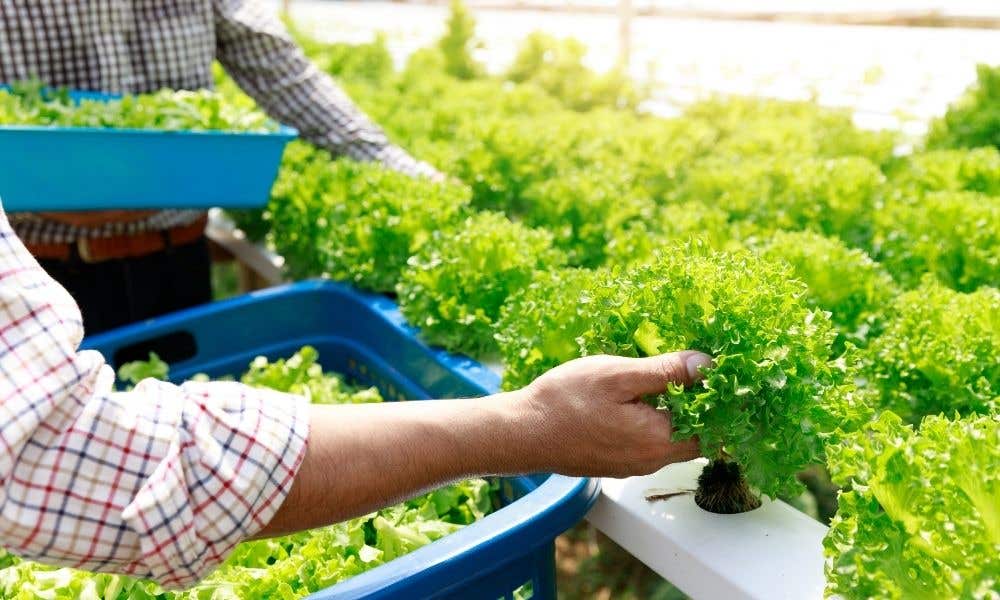Once you have learned how to expertly garden with hydroponics, you may want to grow a larger garden and start a farm or business. Though a hydroponic farm often involves startup costs, you can create a successful business. No matter what your reasons are for wanting to start this venture, you should know the details about how to start a hydroponic farming business. Put your skills to the test and use our tips to develop a hydroponic farm you love.
Know Your Expenses
Before you begin your adventure into the business of hydroponics, it is important to create your budget. A hydroponic farm business comes with its fair share of expenses. You often need to set aside money for your small hydroponic garden at home, but if you are transitioning from a small garden to a large farm, you will need to consider your budget. Create a plan that includes the following expenses:
Immediate Costs
Your immediate costs consist of one-time purchases, or things you will rarely buy again. This includes land, the farm itself, and permanent fixtures for your office space. Though they may cost the most money, you only need to pay for them once or twice—unless you rent any equipment or land. Consider these immediate costs:
- Land
- A greenhouse
- Permits and registration
- An industrial-sized hydroponic system of your choice
- UV lights (if not working in a greenhouse)
- Climate control
- Automation
- Pest control
- Optional office space and furnishings
Recurring Costs
When starting your business, think about recurring costs. Many times, these expenses will start out very costly but gradually become cheaper. You may find ways to lessen your regular or monthly bills, especially if you are frugal. Some expenses may even be optional in your case. Do some research on the area in which you want to start your hydroponic farm to figure the exact costs. Think about these recurring costs when creating your budget:
- Water
- Electricity
- Seeds (in some cases, you can harvest your own)
- Routine maintenance or repairs
- Employees
- Replacement growing medium
- Fertilizer, nutrients, and pH stabilizers
- Internet (if running an office)
- Cost of traveling to your greenhouse and transporting products
Purchase Enough Space for Your Greenhouse
It is important to have enough space on your property for a large greenhouse. The size of your greenhouse depends entirely on how you want to develop your organization. Of course, this is different for everyone. If you want a specialized farm with only one type of product, then you may need a smaller greenhouse than someone who wants to run a large farming operation. The cost of your property and greenhouse can reach a price of up to $10,000, so plan and budget carefully.
Make sure to install plumbing, heating, and electricity in your greenhouse for easy water, sun, and climate control. Natural sunlight may provide ample nutrients, but it is crucial to invest in sun covers for areas where the sun could scorch plants in the summer—like hot, arid deserts.
Set up Your Hydroponic Garden
After constructing your greenhouse, you can fill it with your hydroponic system. Leave enough room between racks and tables for yourself and your employees to tend to each plant. Your hydroponic system may cost the most after your greenhouse.
Once the system is ready for plants, start growing! Ensure your greenhouse is pest-free by starting seeds in a tray with hydroponic growing medium and providing them with gentle care while they sprout. Once they have sprouted, you can place the seedlings in the hydroponic system and garden as you would at home—just be sure to account for the size of the gardens when measuring nutrients and fertilizer.
Who Are You Growing for?
If you are struggling with deciding on what you want to grow, consider your target market. Who do you think would buy your products? You may be creating a small hydroponic farm for unique or out-of-season produce, or growing a large farm for charity work and local restaurants. Your market determines your produce, farm size, and advertising methods. You must consider your markets when you start a hydroponic farming business.
Name and Create Your Business
Next, you need to address the legal steps that come with owning any business, but especially agricultural businesses. Create a catchy name that will attract your audience and give an idea of what you do. If you plan on growing hemp in your hydroponic garden for CBD products, try to create something clever that meshes the hemp aspect with the natural element of hydroponic growing. Masking the fact that you grow hemp may help you with business loans and registrations, even when it is legal to grow.
Research the local permits and registration steps you need to take in your area. There may be fees and taxes for selling produce, and the registration process will be different for each state. You may need the assistance of a bank or a lawyer to cover all your bases when addressing legal concerns.
Stay Active in Local Markets and Gatherings
With your business taking root and your plants blossoming, it is critical for you to stay active in the community. Participate in local markets, rent booths at events, and start advertising your business in the proper avenues. Donate extra food to shelters and kitchens for those in need to build your reputation around town. Know who your competition is, such as large industries and big businesses, and work with other growers whenever possible. Make positive impressions in your area with the right kinds of people, and you will retain a steady flow of customers.
No matter what step you are at in your hydroponic farming business, whether you are conceptualizing it or processing registration, you can rely on FloraFlex to supply your garden with the best equipment. From our organic powder fertilizer for hydroponics to grow mediums to irrigation systems, our online store and network of local wholesale retailers have you covered. Stay connected with us on every leg of your farming journey. Contact us today for more information on how to take your gardening to the next level.

















